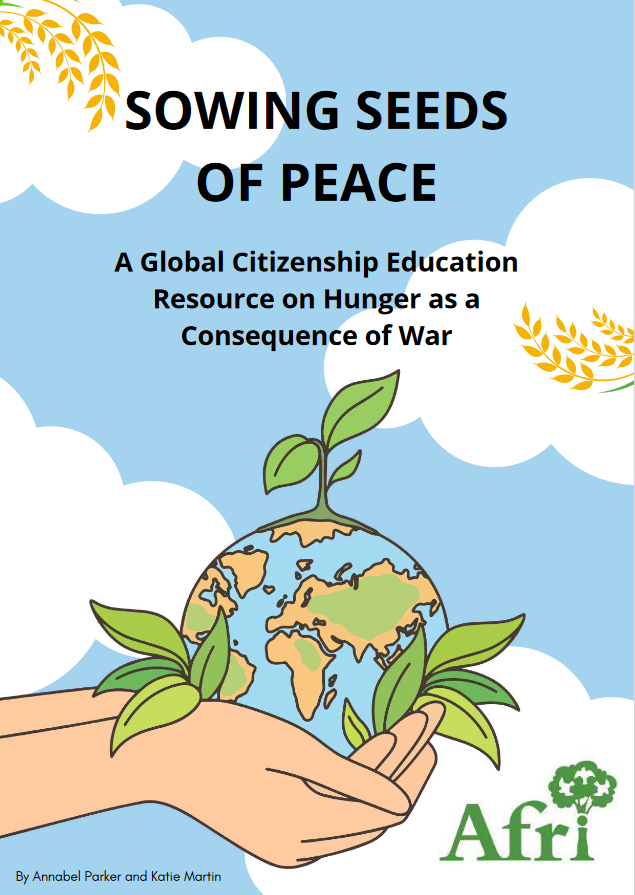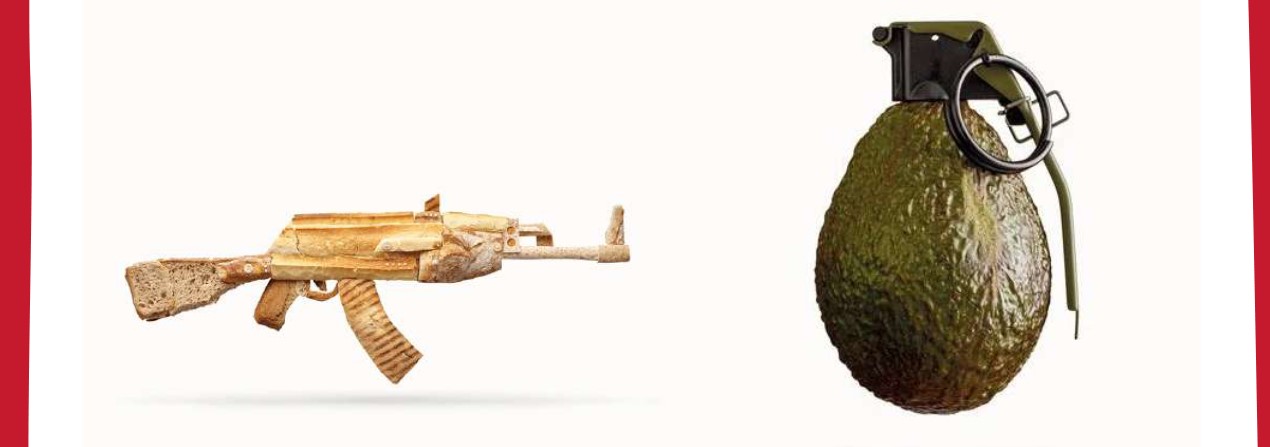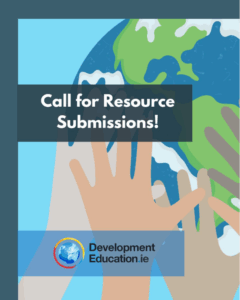- Graphics from the Hunger Kills campaign by Concern Worldwide. Featured in Sowing the Seeds of Peace by Afri (2024)
Ciara Regan reviews Afri’s latest resource, Sowing Seeds of Peace, for post primary teachers which is adaptable and immediately useful across a range of school subjects.
Afri stands for Action from Ireland. Their goal is the promotion of global justice and peace, and the reduction of poverty. This includes, but is not limited to, the progressive reduction of global militarisation and responding to the threat of climate change, corporate control of resources and water, and interference with food sovereignty. Afri responds to injustice caused by militarisation, environmental destruction and resource depletion. They do this through analysis, education and action in solidarity with marginalised people in the ‘Global South’ and also in Ireland and elsewhere in the so-called ‘developed world’.
With this, Afri published Sowing Seeds of Peace, a Global Citizenship Education Resource on Hunger as a Consequence of War.
It is a resource for post primary teachers who wish to facilitate an understanding of the interconnection between war and hunger.
The key message in this resource is exactly that: connection.

The writers, Annabel Parker, Katie Martin and Larysa Karankovich, urge educators:
…to move away from seeing and teaching about war and hunger as natural phenomena, and to ensure students see both as political and human failures of will and empathy.
The resource includes a general introduction to the importance of the United Nations (UN), an institution built upon the very concept of ‘never again’ in the wake of WWII, setting the context of such an institution.
The authors argue for the prevention of the further devaluing and undermining of the UN itself, especially by the ‘big powers’, with Afri Co-ordinator Joe Murray referring to it as ‘the greatest global forum that exists in our world today‘.
I am sure that given the current context in Gaza, many might disagree with the word ‘greatest’ being used, but I think that is what makes this resource so strong. It stands firm in its belief in such institutions, and doesn’t pull any punches, creating spaces for hugely important conversations and provokes debate and discussion around these (uncomfortable!) connections, in a supportive manner.
The authors also explore the Sustainable Development Goals in general and more specifically, Goal 16 (Peace, Justice and Strong Institutions), Goal 2 (Zero Hunger) and Goal 17 (Partnerships for the Goals). However, the authors appear to be left wanting when it comes to the 17 SDGs as a whole as they have decided to add one more: ‘To Abolish War and the Arms Industry’. Another topic bound to create some fruitful conversations and debates in any educational context (or any context, for that matter!).
Each of these topics are facilitated through games, activities and reflection, in true development education style. Overall, the authors state that the aim of the resource is to understand the issues, but ultimately their hope is to support participants in actively building peace and emphasise the importance of the final chapter ‘Sowing the seeds of Peace as active citizens’. A hugely important aspect that all too often gets lost in conversations around war and conflict.
If you are a post primary teacher (or in any educational setting with young people of this age) and are unsure how to bring the horrors of what is happening around us to the classroom, without putting too much weight on young shoulders, but desire to sow seeds of understanding with a view to taking action, then this is the resource for you.
‘Sowing the Seeds of Peace’ takes a mindful and engaging approach to the issue of hunger and war while not shying away from confronting what needs to be done in response (and what currently isn’t being done!).
To use the words of Joe Murray again,
‘Afri sees war as inseperable from and intrinsic to climate change, two sides of the same coin that is posing an existential threat to the future of our planet. Consequently, opposition to war and promotion of peace is central to our work‘.
And this resource does exactly that. Exactly what it says on the tin.
- Download and access Sowing the Seeds of Peace from the resources library.





